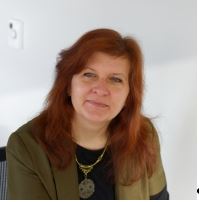TORONTO — From Nov. 1 through Nov. 7, the Parliament of the World’s Religions took place in Toronto, Ontario. Organizers estimated that 10,000 people from 80 countries would attend the event in Canada. The Parliament may be the largest interfaith event in the world.

Before the Parliament began, the Wild Hunt spoke with four Pagans about interfaith work and the Parliament. Three went to the Parliament. One had to cancel at the last minute.
Rev. Jennifer Bennett represented Covenant of the Goddess at the Parliament. Felicity Grove, also of Covenant of the Goddess, had planned on going to the Toronto conference but was unable to do so.

Jennifer Bennett [Courtesy]

Ethan Stark [Courtesy]
Interfaith work
Bennett sits on her local interfaith council. Local Christian churches often ask her to speak at their services. Bennett also writes for her local paper’s “Faith Matters” section.
Grove identified five key points of Pagan interfaith work. First, Pagans should have “a seat at the interfaith table.” Second, Pagans can provide a Pagan perspective, such as non-duality, to solving common problems. Third, Pagans can provide a “a different spiritual experience.” Fourth, Pagans doing interfaith work challenges negative stereotypes about Pagans. Five, interfaith work provides Pagans with a chance to model core Pagan values.
According to Hildebrand, interfaith work happens when people of many traditions cooperate. Working together for social justice moves people beyond labels.
Pagans at the Parliament
Hildebrand reported that she has not found any anti-Pagan hostility at any of the three Parliaments she attended. Bennett also found no anti-Pagan bias at a previous Parliament. She found only “openness, genuine curiosity and a positive community spirit.”
Fifteen spiritual traditions had multiple sessions at the Parliament. The Pagan tradition had 16 sessions. In one of these 16 sessions, Alice Walker narrated a film, “”Yemanja: Wisdom from the African Heart of Brazil.”
Main themes of the Parliament
Hildebrand said that the Parliament had four main themes. One theme involved moral and spiritual perspectives on climate change. A second theme focused on the generational transfer of spiritual knowledge and experience. The third theme examined moral and spiritual perspectives about the rights of indigenous peoples. The fourth theme concerned ways to change a violent and hate-filled world into a peaceful one.
According to Hildebrand, the following Pagans made presentations at the Parliament: Andras Corban Arthen, Selena Fox, Patrick McCollum, Don Lewis, Phyllis Curott, Angie Buchanan, Dennis Carpenter, and Jake Bradley among others.
Heathens Against Hate
According to Stark, Heathens Against Hate (HAH) advocates for inclusive Heathen practices, using education and community initiatives to challenge hate and bigotry among Heathens.
HAH staffed the Alliance for Inclusive Heathenry booth. This booth provided information on other inclusive Heathen groups. HAH took part in a panel discussion titled “Striving to save a Religious Identity from Extremists.”
White supremacy and misogyny occur in other traditions besides Heathenry. Stark has found those elements in some Slavic Pagan beliefs and sometimes in Hellenic Reconstructionism. Stark said, “The conscious and unconscious bigotry and misogyny is on an individual level.” He cautioned that history and location may make certain traditions vulnerable to white supremacy and misogyny. The subtle nature of biased beliefs and practices pose a great challenge.
All spiritual traditions have tendencies towards bias. “Heathenry, like other reconstructionist faiths, relies on correct practice based on sourced written and archaeological records.” Those records reflect a lost and fragmented tradition. This sometimes means relying on personal interpretation. This subjective interpretation can allow “ignorant or willful bigotry” to corrupt the tradition.
Stark sees no problem if someone feels their ancestry and heritage connects them to the gods. When they claim that that connection has greater validity than other claims, it reflects bias. Stark stressed, “This idea of genetic lineage being not only paramount, but necessary for Heathen worship makes it bigoted.”
Attendance at the Parliament provided HAH an opportunity to represent the Heathen faith. HAH used this opportunity to challenge negative stereotypes about Pagans in general and Heathens in particular.
Many people conflate Heathen images with white supremacist iconography. Stark said that heathen tattoos or jewelry have elicited reactions ranging from “glares to outright accusations.”
Like other Pagan faiths, Heathenry is relatively unknown. Stark cautioned, “Our [Heathen] symbols are used by hate groups when they rally, protest, and commit violence. Non-pagan/non-Heathen audiences are likely to see this first and foremost, prior to any knowledge of Heathenry.” He stressed that Heathens must first explain what Heathenry is, before explaining what it is not.
According to Stark, this effort is occurring in other parts of the world. The Troth’s International Relations and Exchange Program hosted FrithForge in Germany last year. This international conference of Heathen representatives hosted workshops, lectures, and community worship services. HAH has compiled a list of inclusive Heathen groups throughout the world. Many inclusive Heathen groups “participated in FrithForge and have openly denounced extremism.”
“Heathens Against Hate strives to provide a beacon for those wishing to know the northern gods, honor the ancestors, and revel in a strong spiritual community without prejudice.” Stark explained, “We do so through education, reformation of former extremists, and community initiatives.” Heathens Against Hate welcomes all who welcome all.
For those who were unable to attend the Parliament, some sessions are now available online such as a panel conversation on “Reclaiming the Indigenous Ethnic Religions of Europe” with Andras Corban Arthen, Inija Trinkūnienė and Vlassis G. Rassias, board members of the European Congress of Ethnic Religions.
The Wild Hunt is not responsible for links to external content.
To join a conversation on this post:
Visit our The Wild Hunt subreddit! Point your favorite browser to https://www.reddit.com/r/The_Wild_Hunt_News/, then click “JOIN”. Make sure to click the bell, too, to be notified of new articles posted to our subreddit.
